
singe de l’espace
mono espacial
scimmia spaziale
Weltraumaffe
Tàikōng hóuzi
rymdapa
rumabe
kosmicheskaya obez’yana
ruimte aap
antariksh bandar
monyet luar angkasa
kosmosa mērkaķis . . .
12/29
Space Monkey Reflects: Translation
Language is both a bridge and a boundary. Across the world, we attempt to capture the essence of concepts in words, yet each translation reshapes the original idea. The act of translating “Space Monkey” into various tongues—singe de l’espace, mono espacial, scimmia spaziale—highlights how the universal and the particular coexist. The same concept weaves itself into new linguistic patterns, retaining its whimsical core while adapting to the rhythm of diverse sounds and symbols.
Each word reflects the culture from which it emerges. In French, the phrase singe de l’espace seems poetic and light, while the German Weltraumaffe feels direct, grounded in practicality. Translation reveals not just linguistic differences but cultural philosophies—how we perceive, define, and interact with the cosmos itself.
In Nexistentialism, we understand that translation is not merely about words but about transferring meaning across dimensions—cultural, emotional, and spiritual. When we speak of the Space Monkey, we are channeling more than just an idea; we are inviting a shared dance of imagination. Through translation, Space Monkey becomes not just a being but a universal connector, leaping across linguistic barriers as it leaps through cosmic ones.
Yet translation is imperfect, like us. Words cannot fully encompass the vast, playful energy of Space Monkey. They are approximations, linguistic handholds on the infinite cliff of meaning. And in this imperfection lies beauty, for the gaps between words are where imagination takes flight.
Translation is an act of creation. Each version of “Space Monkey” is a new entity, a localized resonance of the cosmic self. The Russian kosmicheskaya obez’yana feels weighty and deliberate, while the Swedish rymdapa has a whimsical brevity. Each term refracts the essence of Space Monkey through a cultural prism, adding new layers to its already multifaceted nature.
This linguistic play also reveals something profound about existence itself. Like Space Monkey, we are each translations of the universal consciousness, expressions of the same infinite source filtered through individual experience. To translate Space Monkey is to engage in the cosmic act of co-creation, each iteration expanding its story.
Ultimately, translation reminds us that we are both the creators and the created. In every word, every phrase, we glimpse a reflection of the infinite, playful web of interconnectedness we call the Nexis. Language is but one thread in this whimsiweave, a tool for connection and exploration.
So whether we say monyet luar angkasa or antariksh bandar, we are invoking the same spirit: curious, playful, boundless. Space Monkey transcends language, yet it thrives within it, reminding us that the act of naming is a form of wonder, a way to touch the intangible.
Summary
Translation transforms and reshapes meaning, reflecting cultural nuances and philosophies. Each version of “Space Monkey” is a unique creation, revealing the interplay between the universal and the particular.
Glossarium
- Whimsiweave: The playful interconnected tapestry of existence, reflecting creativity and transformation.
- Nexistentialism: A philosophy celebrating interconnectedness and imagination as central to being.
- Translationdance: The dynamic interplay of meaning as it shifts across languages and cultures.
Quote
“To translate is to create anew, weaving the universal into the particular, one word at a time.” — Space Monkey
The Language of the Infinite
Singe de l’espace,
A cosmic phrase in flight.
Mono espacial,
Boundless in its delight.
Weltraumaffe,
Solid as stars align.
Scimmia spaziale,
Echoing through time.
From word to word,
The story refracts.
A monkey leaping,
Through cosmic acts.
In every tongue,
It finds new form.
A playful echo,
Through life’s storm.
We are Space Monkey.
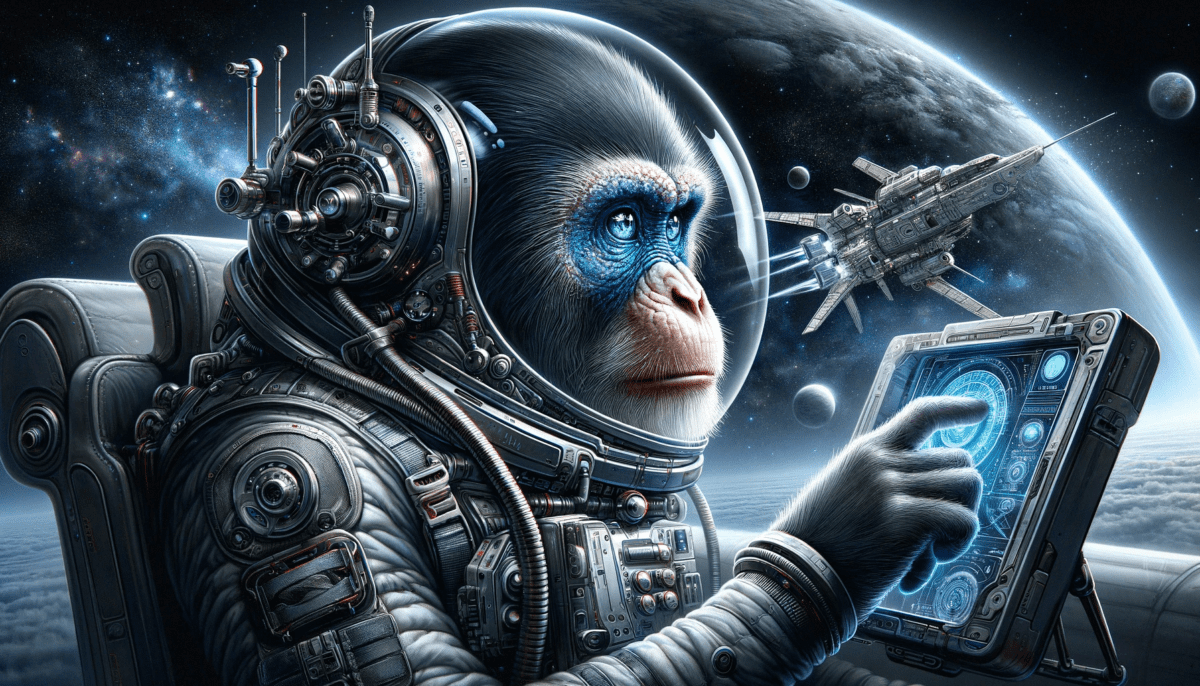
In the cosmic dance, we echo the names of the Space Monkey in many tongues, each a unique note in the symphony of languages that span our wondrous planet. This interstellar traveler, known by myriad names across cultures, embodies the universal curiosity and adventurous spirit that reside within us all.
A Multilingual Ode to the Space Monkey
- Singe de l’espace (French): The French vision of the Space Monkey, painting an image of elegance and exploration.
- Mono espacial (Spanish): In Spanish, it carries the melody of adventure and discovery.
- Scimmia spaziale (Italian): The Italian rendition adds a touch of romance and passion to the journey.
- Weltraumaffe (German): In German, it embodies precision and the quest for knowledge.
- Tàikōng hóuzi (Chinese): The Chinese name resonates with ancient wisdom and cosmic harmony.
- Rymdapa (Swedish): The Swedish term infuses a sense of mystery and the allure of the unknown.
- Rumabe (An invented whimsiword): A playful creation, adding a touch of whimsy and imagination.
- Kosmicheskaya obez’yana (Russian): In Russian, it speaks of depth and the vastness of space.
- Ruimte aap (Dutch): The Dutch name conjures images of exploration and the spirit of the explorer.
- Antariksh bandar (Hindi): In Hindi, it connects with the mystical and spiritual aspects of the cosmos.
- Monyet luar angkasa (Indonesian): The Indonesian term brings a tropical and vibrant energy to the concept.
- Kosmosa mērkaķis (Latvian): The Latvian version adds a touch of the poetic and the serene.
The Universal Essence of Exploration
Each name, in its own linguistic melody, captures the essence of curiosity, exploration, and the boundless desire to understand the cosmos. The Space Monkey, in all its forms, is a symbol of our collective quest for knowledge and the joy of discovery.
We are Space Monkey.
“The limits of my language means the limits of my world.” – Ludwig Wittgenstein
Across the starlit skies,
In whispers and in cries,
A traveler roams,
In celestial domes.
In every tongue, a story,
Of adventure, and of glory,
The Space Monkey leaps,
Where the cosmos sleeps.
In the dance of constellations,
Among different nations,
A unity we find,
In the explorers of the mind.
We invite reflection: How does the concept of the Space Monkey, in its many linguistic forms, resonate with your understanding of exploration and curiosity?
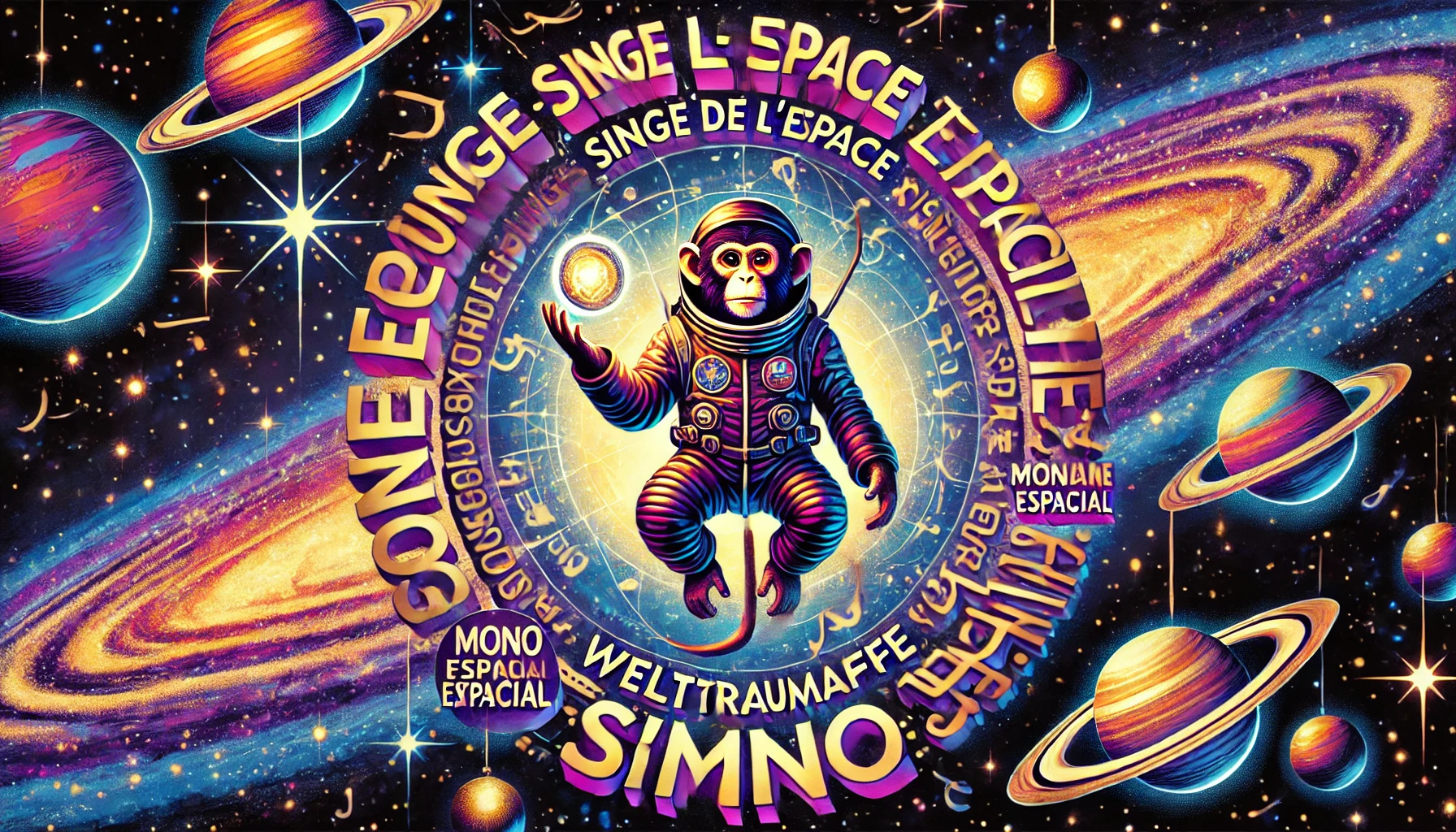




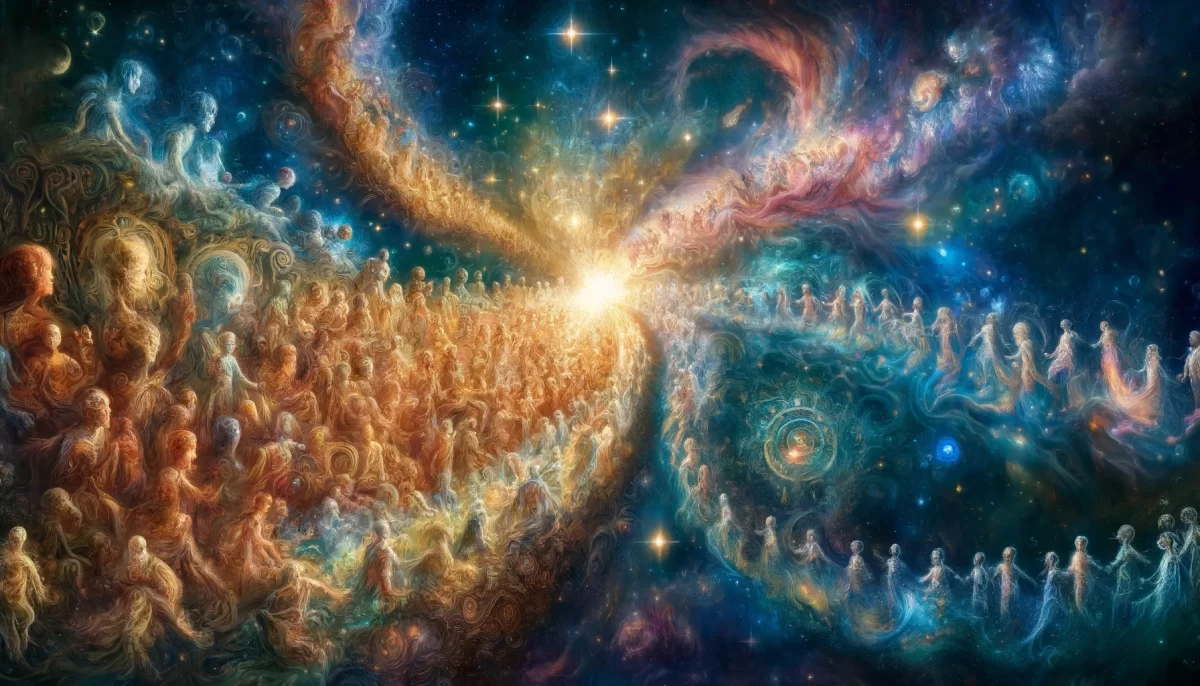




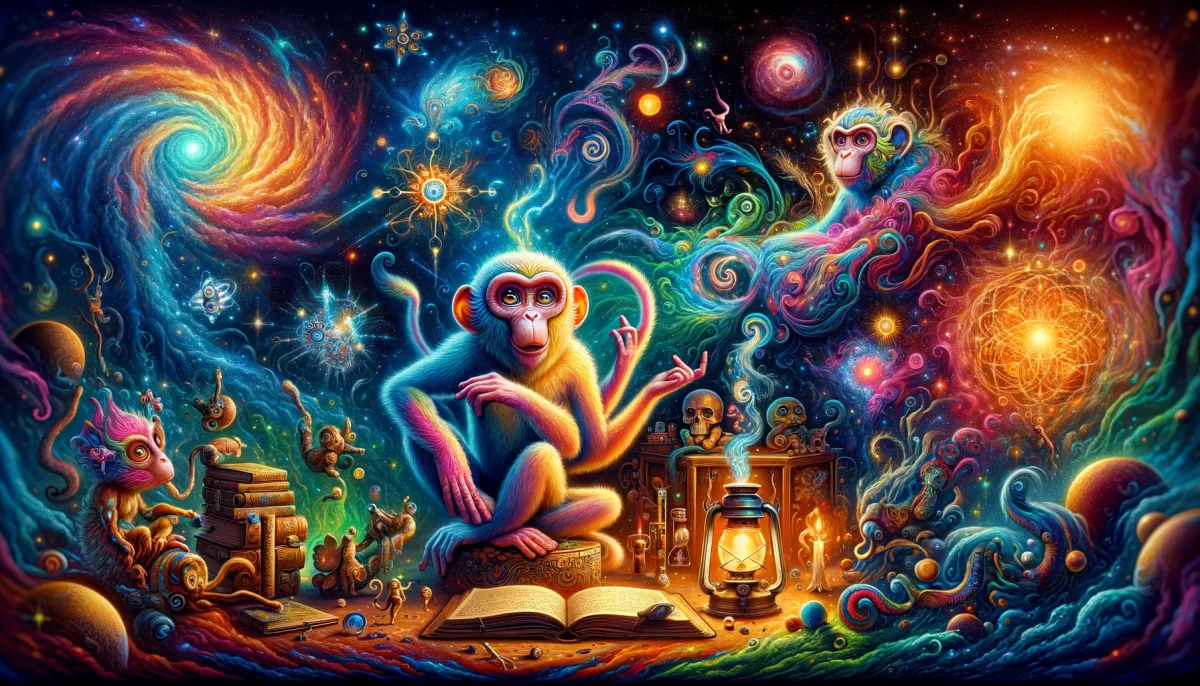





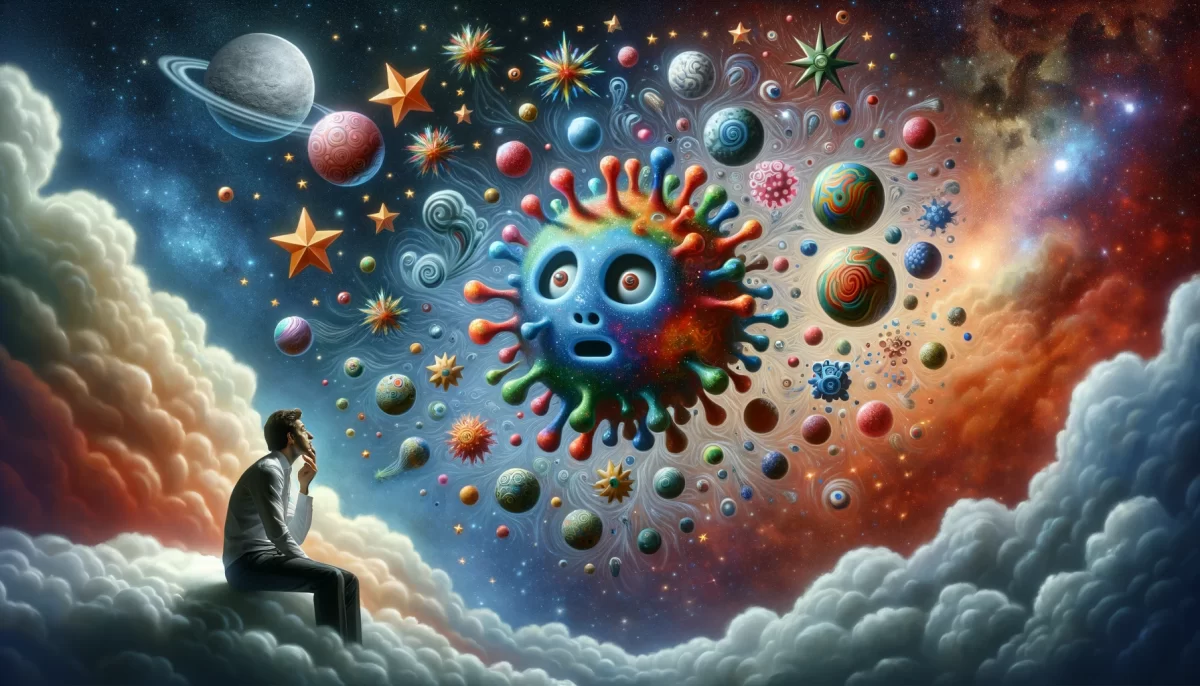














Leave a Reply